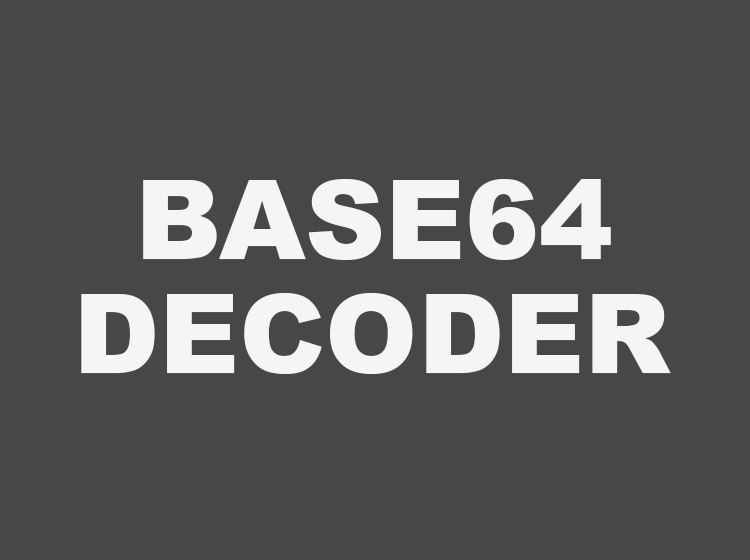
Base64 decoder
Created on 6 October, 2024 • Converter Tools • 82 views • 3 minutes read
Base64 Decoder: Unlocking Encoded Data with Ease
A Base64 decoder is a tool that converts Base64 encoded data back into its original binary or text format. This process is essential for accessing information that has been encoded for safe transmission or storage, such as images, files, or other data types.
What is Base64 Decoding?
Base64 decoding is the reverse process of Base64 encoding. When data is encoded using Base64, it is transformed into a text format using a set of 64 characters. A Base64 decoder converts that encoded text back into its original binary or text form, allowing you to use the data as intended.
Why Do You Need Base64 Decoding?
Base64 encoding is often used to make binary data compatible with text-based systems. However, to make the data useful again (such as retrieving an image or file), you need to decode it. This is where a Base64 decoder comes into play, converting encoded data back to its original form.
How Does a Base64 Decoder Work?
A Base64 decoder works by reversing the encoding process. Here’s a step-by-step breakdown of how Base64 decoding works:
- Input Encoded Data: The Base64 encoded string is taken as input.
- Grouping Characters: Each Base64 character corresponds to 6 bits, and groups of 4 Base64 characters are converted back to 3 bytes (24 bits).
- Conversion to Binary: These groups of 4 Base64 characters are mapped back to their binary format, resulting in the original data.
Example of Base64 Decoding
If you have the Base64 encoded string "SGVsbG8=", a Base64 decoder would convert this back to the original text, "Hello."
Benefits of Using a Base64 Decoder
1. Retrieving Original Data
Base64 encoding is often used for transmitting data like images, files, or other non-text data types over text-only protocols. A Base64 decoder helps retrieve the original binary data from the encoded text.
2. Wide Application in Web Development
Base64 decoding is crucial in web development when dealing with images, files, or other assets that need to be embedded or transferred in a text format (e.g., JSON). Decoding converts the Base64 data into usable file formats like images, audio, and video.
3. Interoperability Across Platforms
Base64 encoded data can be transferred across different platforms and systems, making it a universal encoding method. A Base64 decoder ensures you can easily retrieve the data on any platform.
Common Uses of a Base64 Decoder
Base64 decoding is widely used across different domains. Here are some of its most popular applications:
1. Email Attachments
Emails with binary attachments often use Base64 encoding. A Base64 decoder helps decode the attachments back to their original form, allowing the receiver to access files, images, and documents.
2. Image Embedding in HTML
Web developers use Base64 encoding to embed small images directly in HTML or CSS files. To retrieve and display these images, a Base64 decoder converts the encoded string back into image format.
3. API Data Transmission
When binary data is sent through APIs in Base64 format, a Base64 decoder ensures that the transmitted data is properly decoded on the receiving end.
How to Use a Base64 Decoder
Using a Base64 decoder is straightforward. You can either use an online Base64 decoding tool or write a simple program in various programming languages to decode your data.
Step-by-Step Guide:
- Input Encoded Data: Paste the Base64 encoded string into the decoder.
- Click Decode: Press the "Decode" button to convert the Base64 data back to its original format.
- Retrieve Data: Once decoded, the original text or binary file will be displayed or available for download.
Base64 Decoding in Programming Languages
Here are some ways to decode Base64 data in popular programming languages:
- Python:pythonCopy codeimport base64 encoded_data = b'SGVsbG8=' decoded_data = base64.b64decode(encoded_data) print(decoded_data.decode('utf-8')) # Outputs: Hello
- JavaScript:javascriptCopy codelet encodedData = 'SGVsbG8='; let decodedData = atob(encodedData); console.log(decodedData); // Outputs: Hello
Top Online Base64 Decoders
There are numerous online tools available that can help you decode Base64 strings quickly and easily. Here are some of the best Base64 decoders available:
1. Base64 Decode by Base64.guru
This tool allows you to input encoded text or files and decode them back into their original format. It’s user-friendly and supports various file types.
2. Base64 Decoder by CyberChef
CyberChef offers a comprehensive suite of encoding and decoding tools, including a Base64 decoder. It's a powerful tool for developers needing more advanced options.
3. Base64 Decode Tool by Browserling
Browserling provides a simple Base64 decoder that is efficient for decoding strings back into text or binary files.
Conclusion
A Base64 decoder is an essential tool for transforming encoded data back into its original format. Whether you're decoding email attachments, web-embedded images, or API-transferred data, Base64 decoding ensures that you can safely and effectively retrieve the data you need. With online tools and programming languages providing easy Base64 decoding solutions, working with encoded data has never been more straightforward!
Popular posts
-
Ascii converterConverter Tools • 116 views
-
Hex converterConverter Tools • 106 views
-
Binary converterConverter Tools • 95 views
-
Case converterText Tools • 92 views
-
DNS LookupChecker Tools • 91 views